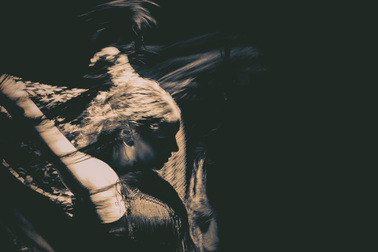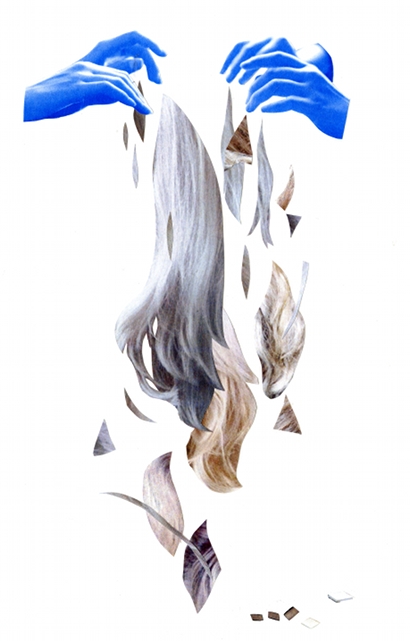|
The teenage sleuth wasn’t built for love triangles. The teenage sleuth was built for the wholesome boyfriend with the plain best friend at her side. She was meant to be engaged right out of college after getting her degree (if not just her MRS). Her plain best friend would be her maid of honor because her plain best friend would not steal the show. The teenage sleuth was meant to live in a cul-de-sac and have a boy and girl each. Perfectly balanced, because that’s what teenage sleuths do. But only after she is a teenage girl and only after she is a sleuth. After she has solved murders and burglaries and arsons and forgeries. Then she will pack them away like childish toys.
Read more at Allegory.
0 Comments
There is a restaurant at the end of the world. If you do not know where that is, I cannot blame you. Google Maps has yet to chart it. Take a turn off Memory Lane and it’ll be on your right. If you’ve hit Easy Street, you’ve gone too far.
Read more at Molotov Cocktail. When the fairytale princess breaks up with the fairytale prince, she moves back to her old cottage. Someone has been taking care of its upkeep — maybe the dwarves, maybe the mice she used to talk to. Maybe even the genie. She doesn’t question it.
She didn’t bring any of her gowns with her and so she puts on her old peasant dresses. She twirls in front of her magic mirror, asks who the fairest of them all is. When he says it’s her, well, it doesn’t give her the same satisfaction it used to. Read more at Jellyfish Review. The biggest attraction at the microzoo was, of course, the tardigrade. Guests would come from all over the world to be shrunken down to size, their hands now small against the metal poles that separated the micro-animals from their guests, and marvel at this strange, slow creature, its body like a wormy cloud. They would throw miniaturized peanuts into its pen, whistle at it, call for it by name—Piglet—as if it were a lion, or giraffe, or wild coyote at the local zoo. And the tardigrade would ignore them, moving as if it were submerged in water, its body coming so close to the poles you could almost touch it—but always your hand would retreat before doing so, as if repelled by something on the tardigrade’s skin.
Read more at Lammergeier. You’re 19 when a man offers you the only thing you’ve ever wanted: you can travel wherever you want, to whatever time you want. All you have to do is leave your family behind and never see them again.
You’re 19 and this is an easy decision. You board his ship without saying goodbye, and there you go. *** You’re 21 when you end up in Los Angeles during the seventies. Everyone is long hair and long pants and long blouses. Everyone is always sniffling. Everyone is always asking you where you’re from. “I’m from here,” you lie. You always say you’re from here. From there. From nowhere. Are any of them really lies? Your life is one party after the next, the hours blending so seamlessly you can’t tell how you got from one loft to the next apartment. It’s seamless the way cigarette smoke disappears into the air. The way bubbles burst. The way leaves flutter down from the trees in everywhere else but LA. Read more at Split Lip Magazine Marina had always known she would be a Mother. She had no discernible talent, wasn’t particularly pretty or intelligent. But she had a womb, and the moon needed those.
She signed up the day she became legal, scrawling her name across a thick black line in her still childish-looking cursive. Marina didn’t tell her parents. She took her advance and a week before she was supposed to leave, she broke the news. Her mother cried for days. Her dad put up a listing to rent her room. She never told her boyfriend—she just broke up with him two days before she left. When the time came, they sent her a life suit, an aerospace ticket, and a packet full of information on the parents who would take whatever grew in her belly: Jane and Benjamin Monroe. That was about all she needed. Read more at Necessary Fiction. Maria went into the forest one day, and she did not come back. No one really looked for her.
It was almost as if the forest had swallowed her whole, had shielded her beneath its verdant leaves and bowed branches. In another life, in another story, a prince would have gone to look for her. But all of the princes at that time were occupied. Maria entered the woods for the reason most young girls enter the woods: her father was sick and needed medicine. So, when she disappeared, so did he. The day the forest took her, she carried with her a robe embroidered with flowers, an empty basket, and three ribbons tied into her long black hair. It was these ribbons, yellow, pink and purple, that caught the kapre's eyes. Read more at Wyvern Lit.
 Sometimes I stare at Frankie’s dog tags without ever really thinking about it. Before I fall asleep, I’ll see them glinting in the green and gold lights from the strangers’ ships, and just space out. It isn’t conscious, my staring at them. It’s almost like I can’t stare at anything else. I used to wear them around my neck, but my mother put a stop to that. Read more on Curiosity Never Killed the Writer.
|
|


